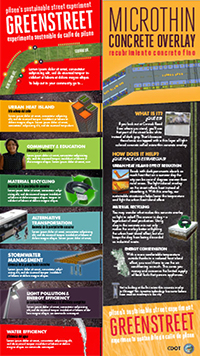Sustainable Infrastructure Standards for Urban Ecology

Outreach Materials (Courtesy of
CDOT)
Chicago Department of Transportation
Project Goals
The Chicago Department of Transportation (CDOT) Eco-Logical grant project supports the outreach and education activities related to its construction of a sustainable streetscape pilot in the Pilsen neighborhood of Chicago that uses Leadership in Energy and Environmental Design (LEED) principles. These activities include the creation of a sustainable design manual and the production of educational kiosks and brochures. CDOT will use the Eco-Logical products to inform regional governments and the public about LEED principles in streetscape design and provide residents with information on how to integrate low-impact strategies into their travel and household patterns.
Project Activities and Accomplishments
CDOT created a sustainable design manual and monitored construction data on the Pilsen project on a weekly basis to assess the project’s progress against the regional metrics outlined in the manual. CDOT completed the project construction and held a ribbon cutting in October 2012. A brochure describing a self-guided walking tour is now available online, and seven kiosks along Cermak Road and Blue Island Avenue educate the public about best practices such as solar-powered streetlights and stormwater catchments. The project has improved awareness of sustainable urban infrastructure in the Pilsen community and has opened up new markets for sustainable technologies by proving them in practice.
Future Steps
CDOT plans to prioritize ongoing data collection and monitoring at the pilot site, which will be used to evaluate performance measures and to assist CDOT in communicating the sustainability benefits to stakeholders and the public. CDOT also plans to apply the sustainable design manual to future work and adapt its performance measures for smaller and larger projects. CDOT is working with the local stormwater utility to overcome the challenges associated with ongoing data collection. While CDOT has a two-year maintenance contract with the project’s construction contractor to steward some of the streetscape elements, CDOT staff is working with a local chamber of commerce to assume maintenance of the streetscape after the contract expires. In the future, CDOT hopes to develop a new decision support tool for balancing a project’s environmental requirements. This tool would measure secondary impacts of design and construction elements and help prioritize among measures such as stormwater management, pedestrian mobility, recycled construction waste, use of local materials, and urban heat island effect.
Insights on Eco-Logical
Partnerships have been and continue to be integral to the CDOT sustainable streetscape pilot. From the outset, CDOT engaged neighborhood groups and other city departments in the planning and execution of the pilot. These relationships allowed CDOT to move quickly and efficiently through the permitting and construction phases. CDOT notes that the Eco-Logical approach is especially relevant for locally-funded projects, such as those under the jurisdiction of city or county governments. Projects that do not rely on State or Federal funds have more flexibility in design and construction standards because they are not subject to NEPA or State specifications. Many of these localities simply rely on State specifications for their project delivery processes because they lack the resources to develop their own; CDOT staff hope that their new sustainable design guidelines will provide a better alternative to these municipalities.
<< Return to Grant Projects

